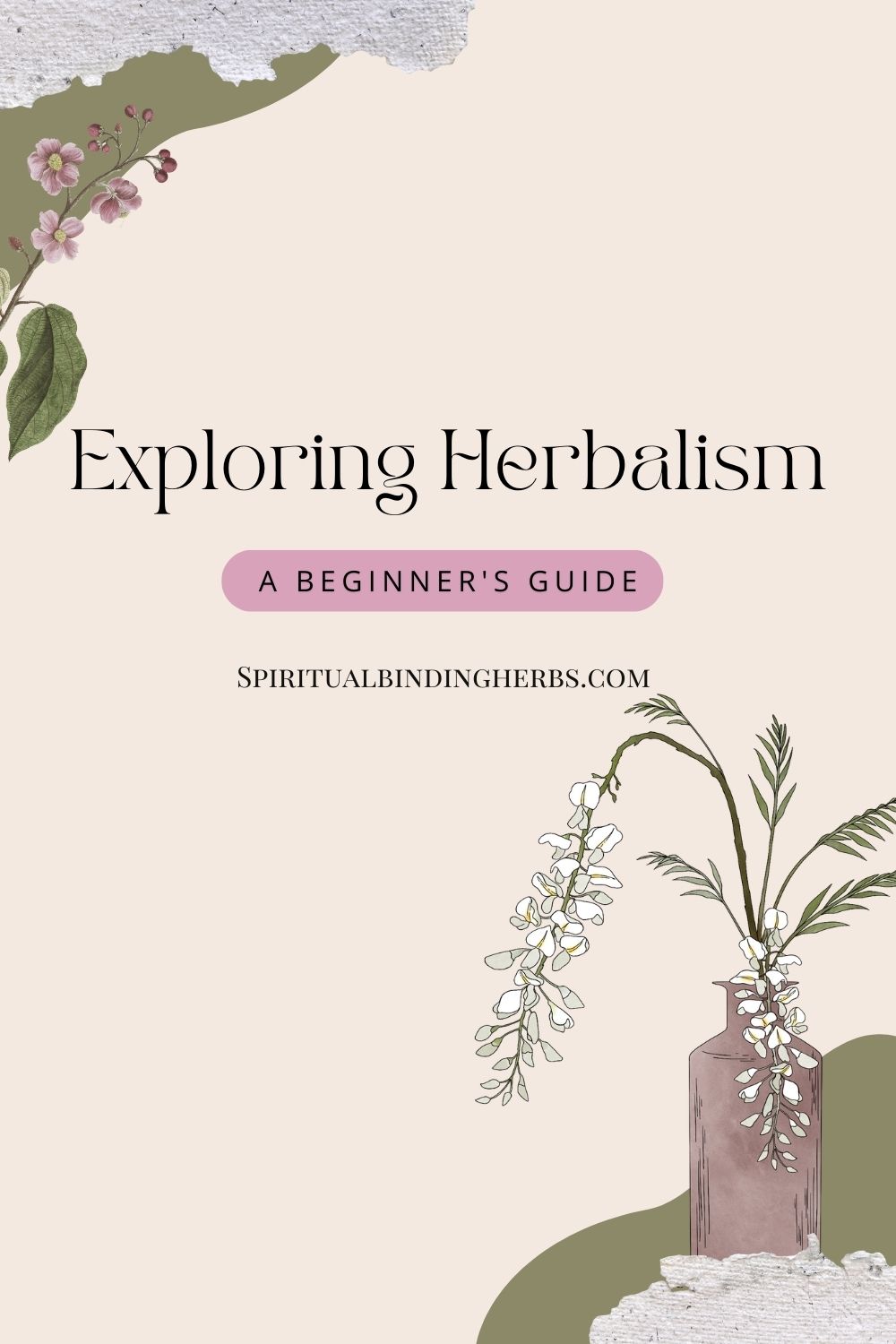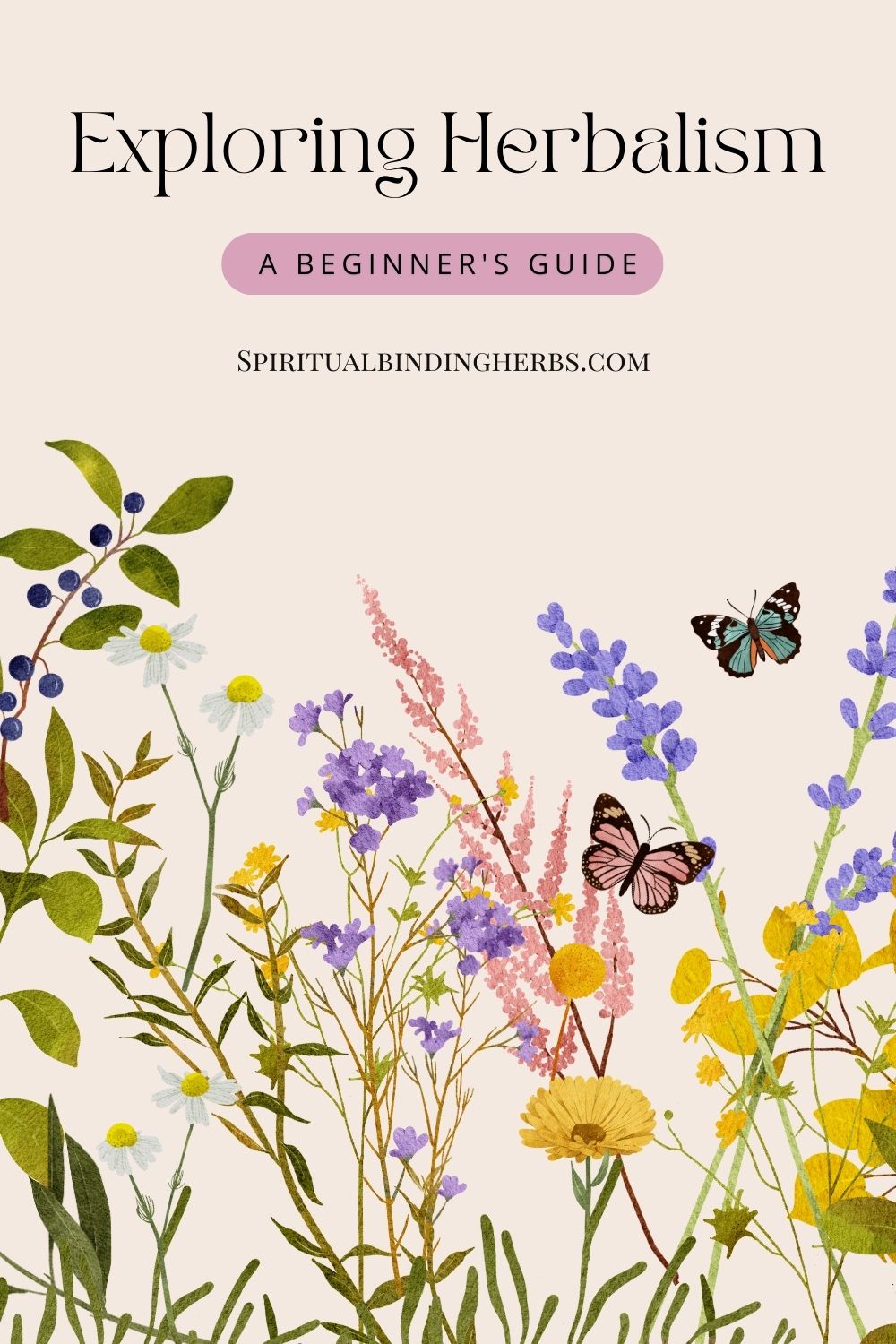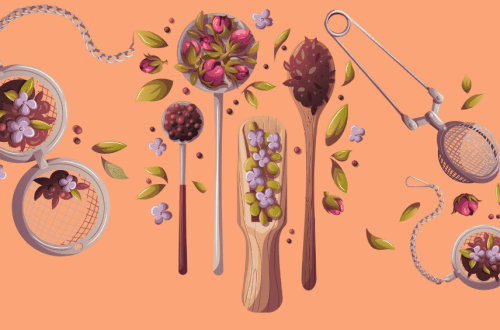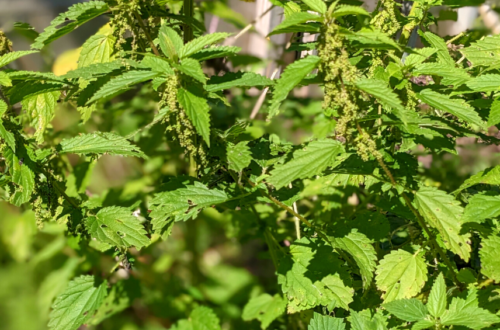
Exploring Herbalism: A Beginner’s Guide
What herbalism is and its relevance today
Herbalism is something that we are all starting to see more and more of nowadays. Across social media there is a plethora of creators and innovators share their knowledge and recipes, some used for generations. There is also many making new discoveries and interpreting mother nature in new, expansive ways. Opening the door for many to answer the calling of their relationship with nature, the earth and the never-ending universe.
- Understanding Herbalism
- Herbalism and its historical roots
- The philosophy behind herbalism – focus on holistic health
- The Basics of Herbalism for Beginners
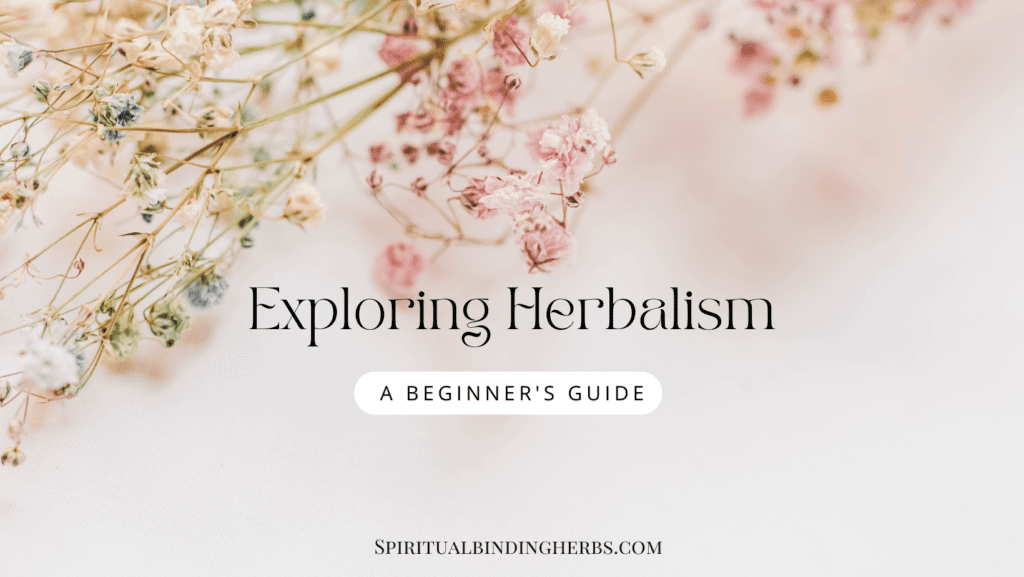
Understanding Herbalism
But what exactly is herbalism? Is it gardening? Is it wild harvesting? Is it foraging and using what’s available? For me, it encompasses all of these things and more. The Oxford Language definition of herbalism is “the study or practice of the medicinal and therapeutic use of plants, especially as a form of alternative medicine.” But let’s peel that back a bit.
Herbalism and its historical roots
Herbalism, at its core, is an ancient practice rooted in the use of plants for medicinal purposes, dating back thousands of years across cultures worldwide. Herbalism harnesses the healing properties of herbs, flowers, roots, and other botanicals to promote health and well-being. Today, herbalism remains relevant as a holistic approach to health, offering natural alternatives to conventional medicine and emphasizing the interconnectedness of the body, mind, and spirit.
Along with growing interest in sustainable living and a return to traditional healing methods, herbalism has seen a resurgence in popularity over the last few years. Its accessibility and focus on self-care empower individuals to take control of their health, whether by brewing a soothing herbal tea, crafting a homemade salve or simply connecting with the natural world around them. As we navigate an increasingly complex healthcare landscape, herbalism offers a time-honored path to wellness that resonates with beginners and seasoned practitioners alike.
So how has herbalism been practiced across different cultures and time periods
Herbalism has a presence in many cultures across the world that dates back thousands of years. It was traditionally passed down orally until amazing people along the way decided to document their findings, so we now have that valuable knowledge at our fingertips.
Many cultures have paved the way for the practice of herbalism and the most time-honored traditions and methods come from:
- Traditional Chinese Medicine (TCM): China has a rich history of herbal medicine, with practices dating back thousands of years. TCM utilizes a vast array of herbs, roots, and other botanicals to restore balance and harmony within the body.
- Ayurveda: Originating in India, Ayurveda is one of the world’s oldest holistic healing systems. It emphasizes the use of herbs, spices, and other natural remedies to promote health and longevity.
- Indigenous Healing Traditions: Indigenous cultures worldwide have their own unique herbal practices, often passed down through generations. These traditions incorporate local plants and knowledge of the land for healing purposes.
- European Herbalism: Herbalism has been practiced for centuries throughout Europe, with each region having its own herbal traditions and remedies. Medieval European herbalism, for example, played a significant role in the development of modern herbal medicine.
- African Herbalism: Various African cultures have rich herbal traditions, with healers using indigenous plants for medicinal and spiritual purposes. Practices vary widely across different regions and ethnic groups.
- Native American Herbalism: Indigenous peoples of North and South America have a long history of using native plants for healing. Herbal remedies are often integrated into spiritual and ceremonial practices.
- Islamic Herbalism: Islamic medicine incorporates herbal remedies mentioned in the Quran and Hadith, as well as contributions from scholars like Avicenna (Ibn Sina) and Razi (Rhazes), who documented the medicinal properties of plants.
Now, keep in mind that these are just a few examples. Herbalism is truly a global phenomenon, with each culture bringing its own unique perspective and practices to the use of medicinal plants.
The philosophy behind herbalism – focus on holistic health
The main thing that attracted me to herbalism is that its whole basis is around holistic health. In order to truly heal, one must look at all parts of themselves, not just the one aliment that has arisen. This is vastly different from traditional Western medicine (in general), and for me, when I started really looking at the imbalance in my mental health, I took a huge step back and looked at all aspects of my life. Our body is one connected circle, the mental effects the physical, the spiritual and vice versa. If you want me to go deeper into this, just let me know, but for now, let’s keep focus on learning about what herbalism is.
So, in general what is the philosophy around herbalism? The philosophy behind herbalism is deeply rooted in the concept of holistic health, which considers the interconnectedness of the body, mind, and spirit in achieving overall well-being. For me, I see this bucketed into five main areas of life:
- Whole Person Wellness: Herbalism views individuals as complex beings with physical, emotional, mental, and spiritual dimensions. Rather than simply treating symptoms, herbalists aim to address the root causes of health imbalances and support the body’s innate ability to heal itself.
- Balance and Harmony: Central to herbalism is the idea of restoring balance and harmony within the body. Herbal remedies are chosen not only for their specific medicinal properties but also for their ability to rebalance the body’s systems and restore optimal function.
- Nature as Medicine: Herbalism recognizes the healing power of nature and emphasizes the use of whole plant remedies in their most natural form. Herbalists believe that plants contain a diverse array of compounds that work synergistically to promote health and that these natural remedies are often gentler and more sustainable than synthetic alternatives.
- Prevention and Maintenance: In addition to treating acute health conditions, herbalism places a strong emphasis on preventive care and maintaining wellness over the long term. Herbalists may recommend lifestyle modifications, dietary changes, and herbal remedies to support overall health and prevent illness.
- Empowerment and Self-Care: Herbalism empowers individuals to take an active role in their health and well-being. By learning about medicinal plants and herbal remedies, individuals can make informed choices about their health and integrate natural healing practices into their daily lives.
Overall, the philosophy of herbalism is grounded in a deep respect for the wisdom of nature, the interconnectedness of all living things, and the inherent healing potential within each individual. By embracing this holistic approach to health, herbalism seeks to promote vitality, resilience, and harmony on all levels of being.
The Basics of Herbalism for Beginners
Herbal medicine and its principles
Herbal medicine, also known as herbalism or phytotherapy, is the practice of using plants and plant-derived substances to promote health and treat various health conditions. When we walk through the history of its origins, we can see that it is one of the oldest forms of medicine, with roots dating back thousands of years to ancient cultures around the world.
So, in general, what is herbal medicine? Well, here are a few of its basic principles categorized into six different buckets. Hopefully, grouping like this will help you better understand and remember the framework. I know when I was just learning these concepts, it was hard to try and remember everything. Remember, you are learning something new, so coming back to these concepts may be needed until they are second nature to you. After years of studying, I still need to refresh my memory from time to time.
- Natural Remedies: Herbal medicine harnesses the healing power of nature by using plants and botanicals as remedies. These remedies can include various parts of the plant, such as leaves, flowers, roots, bark, and seeds, which are used in different forms like teas, tinctures, capsules, and salves.
- Holistic Approach: Herbal medicine takes a holistic approach to health, considering the interconnectedness of the body, mind, and spirit. Rather than just treating symptoms, herbalists aim to address the underlying imbalances or root causes of health issues to support overall well-being.
- Individualized Treatment: Herbal medicine recognizes that each person is unique and may respond differently to herbal remedies. Herbalists take into account factors such as a person’s constitution, lifestyle, diet, and specific health concerns when designing individualized treatment plans.
- Herbal Actions: Herbs contain a wide range of bioactive compounds that have various therapeutic effects on the body. These effects, known as herbal actions, include properties such as anti-inflammatory, antimicrobial, adaptogenic, and sedative. Herbalists select herbs based on their specific actions and how they can best support the body’s healing process.
- Traditional Wisdom and Modern Science: Herbal medicine combines traditional knowledge passed down through generations with modern scientific research and evidence-based practices. While many traditional herbal remedies have been used for centuries, ongoing scientific studies continue to validate their effectiveness and uncover new therapeutic uses for plants.
- Safety and Sustainability: Herbal medicine prioritizes the safety of individuals and the sustainability of plant resources. Herbalists are trained to identify potential risks and contraindications associated with herbal remedies and to promote ethical and sustainable harvesting practices to protect plant populations and ecosystems.
Overall, herbal medicine offers a natural and holistic approach to health and wellness, empowering individuals to take an active role in their own healing journey. Whether used as a complementary therapy alongside conventional medicine or as a primary form of healthcare, herbal medicine provides a rich and diverse toolkit for promoting vitality and supporting the body’s innate ability to heal.
The different forms of herbal medicine (teas, tinctures, capsules, etc.)
There are different ways to use plants. Here are the main formulation methods. Herbalists may use all or a few of these methods. As always, it will take experimentation, trial and error and the more complicated methods may take longer to master. Remember to start simple, try one herb alone to connect with its energy.
- Herbal Teas: Herbal teas are one of the most common and accessible forms of herbal medicine. They are made by steeping dried herbs or herbal blends in hot water. Herbal teas can be enjoyed for their soothing and relaxing properties and various health benefits. Popular herbal teas include chamomile for relaxation, peppermint for digestion, and ginger for nausea.
- Herbal Infusions: Herbal infusions are similar to herbal teas but are made by steeping larger quantities of herbs in hot water for a longer period, typically 15-30 minutes or more. This allows for a more potent extraction of the herb’s medicinal properties. Herbal infusions are commonly used for stronger therapeutic effects and are often consumed for specific health purposes, such as promoting relaxation, supporting immune function, digestion, or relieving menstrual discomfort.
- Tinctures: Tinctures are liquid herbal extracts made by soaking herbs in alcohol or glycerin to extract their medicinal compounds. Tinctures are highly concentrated and often come in small dropper bottles for easy dosing. They can be taken orally by adding drops to water or juice, making them convenient for on-the-go use. Tinctures are valued for their long shelf life and potency.
- Capsules and Tablets: Herbal capsules and tablets are convenient and portable forms of herbal medicine. They contain powdered or dried herbs encapsulated or compressed into pill form. Capsules and tablets are easy to swallow and provide a standardized dosage of herbs. They are commonly used for targeted health benefits and can be found in health food stores and pharmacies.
- Topical Preparations: Herbal medicine can also be applied topically to the skin for various purposes. This includes herbal creams, ointments, salves, and balms, which are made by infusing herbs into a base such as oil, beeswax, or shea butter. Topical herbal preparations are used for skin conditions, muscle and joint pain, wound healing, and aromatherapy.
- Herbal Powders: Herbal powders are finely ground herbs that can be mixed with water, juice, or food for consumption. They can also be encapsulated for easier dosing. Herbal powders are versatile and can be customized to create personalized herbal blends. They are often used for their therapeutic effects on digestion, immune support, and energy.
- Herbal Baths: Herbal baths involve soaking in a tub of warm water infused with herbs. This ancient practice is known for its relaxing and therapeutic effects on the body and mind. Dried herbs can be added directly to the bathwater or pre-packaged herbal blends can be used.
Each form of herbal medicine offers unique benefits and advantages, allowing individuals to choose the method that best suits their needs and preferences.
The Benefits of Herbalism
Herbal remedies, derived from plants and botanicals, offer a natural and holistic approach to health and well-being. While the specific benefits of herbal remedies can vary depending on the plant and its properties, here are some general advantages:
- Natural Healing: Herbal remedies harness the healing power of nature, providing gentle and holistic solutions to common health concerns. Unlike synthetic medications, which may come with unwanted side effects, herbal remedies are often well-tolerated by the body.
- Support for Overall Health: Many herbs are rich in vitamins, minerals, and antioxidants, which can support overall health and vitality. By incorporating herbal remedies into your daily routine, you can nourish your body with the nutrients it needs to thrive.
- Targeted Relief: Herbal remedies offer targeted relief for a wide range of health issues, including digestive problems, stress, insomnia, headaches, and more. Whether you’re looking to soothe an upset stomach, calm your nerves, or boost your immune system, there’s likely an herbal remedy that can help.
- Holistic Approach: Herbalism takes a holistic approach to health, considering the interconnectedness of the body, mind, and spirit. By addressing the root causes of health imbalances and promoting balance and harmony within the body, herbal remedies support not only physical well-being but also mental and emotional wellness.
- Accessible and Affordable: Herbal remedies are often accessible and affordable, making them an attractive option for those seeking natural health solutions. Many herbs can be grown in home gardens or purchased from local markets, making it easy to incorporate herbal remedies into your lifestyle.
- Complementary to Conventional Medicine: Herbal remedies can complement conventional medical treatments, providing additional support for health and wellness. By working in tandem with other forms of healthcare, herbalism offers a comprehensive approach to healing and prevention.
Overall, herbal remedies offer a gentle, effective, and sustainable approach to health and wellness, empowering individuals to take an active role in their own well-being. Whether used alone or in combination with other therapies, herbal remedies have the potential to promote vitality, resilience, and balance on all levels of being.
How Herbalism Can Complement Conventional (Western) Medicine
Oftentimes I see herbalism and conventional medicine pitted against each other. It is portrayed as one or the other, and that simply is not the case. While conventional medicine focuses primarily on treating specific symptoms and diseases with pharmaceutical drugs and surgical interventions, herbalism takes a holistic approach to health, addressing the root causes of illness and promoting overall well-being.
Here’s how herbalism can complement conventional medicine:
- Supportive Care: Herbal remedies can provide supportive care alongside conventional treatments, helping to alleviate symptoms, reduce side effects, and promote faster recovery. For example, herbs like ginger may help ease nausea associated with chemotherapy, while chamomile can support relaxation and sleep during times of stress or anxiety.
- Preventive Health: Herbal remedies can be used preventively to support the body’s natural defenses and reduce the risk of illness. By incorporating immune-boosting herbs like echinacea and elderberry into your daily routine, you may help strengthen your immune system and prevent common infections like colds and flu.
- Managing Chronic Conditions: Herbalism offers natural alternatives for managing chronic health conditions such as arthritis, diabetes, and high blood pressure. While conventional medications may be necessary to manage these conditions, herbal remedies can provide additional support and help reduce reliance on pharmaceutical drugs.
- Promoting Holistic Wellness: Herbalism takes into account the interconnectedness of the body, mind, and spirit, promoting holistic wellness on all levels. By addressing underlying imbalances and supporting the body’s innate healing mechanisms, herbal remedies can help restore harmony and vitality to the whole person.
It’s important to note that while herbalism can be a valuable complement to conventional medicine, it’s essential to consult with healthcare professionals, including herbalists and doctors, especially when dealing with serious health issues or taking medications. By working collaboratively with both conventional and herbal healthcare providers, individuals can optimize their health and well-being using the best of both worlds.
Getting Started with Herbalism for Beginners
- Start with the Basics: Begin your herbalism journey by familiarizing yourself with a few common and easy-to-use herbs. Herbs like peppermint, chamomile, lavender, ginger, and echinacea are versatile and widely available. Experiment with making simple herbal teas or infusions to get a feel for their flavors and effects.
- Learn to Identify and Harvest Wild Herbs: Take the time to learn how to identify and harvest wild herbs in your local area safely. Start with well-known and easily recognizable plants, and always use a reliable field guide or seek guidance from experienced foragers. Remember to harvest responsibly, leaving plenty of plants behind for future growth and for wildlife.
- Educate Yourself: Invest in books, online courses, and workshops to deepen your knowledge of herbalism. There are many excellent resources available for beginners, covering topics such as herbal identification, basic botany, herbal preparations, and herbal safety. Look for reputable sources and trusted herbalists to guide your learning journey.
- Start an Herbal Medicine Kit: Create a basic herbal medicine kit with a few essential supplies, such as dried herbs, glass jars for making infusions or tinctures, tea infusers or strainers, and labels for identifying your herbal preparations. Having these supplies on hand will make it easier to experiment with making your own herbal remedies at home.
- Practice Mindfulness and Observation: Cultivate a sense of mindfulness and observation as you engage with plants and herbal remedies. Pay attention to how different herbs make you feel, both physically and emotionally, and observe the subtle changes in your body and environment over time. Developing a deeper connection with nature and the plants around you is an essential aspect of herbalism.
Remember to approach herbalism with curiosity, patience, and respect for the plants and the wisdom they offer. Enjoy the process of learning and experimenting with herbal remedies, and don’t be afraid to seek guidance from experienced herbalists or healthcare professionals along the way.
Here are a few books I recommend for beginner herbalists, and also, here are my ten herbs for beginners to start growing yourself.
For beginners looking to safely incorporate herbal remedies into their lifestyle, here are some important pieces of advice:
- Research and Educate Yourself: Take the time to research and educate yourself about the herbs you plan to use. Learn about their potential benefits, possible side effects, and contraindications. Gather information from reputable sources such as books, online resources, and trusted herbalists.
- Start Slowly: Begin with small doses of herbal remedies and gradually increase as needed. Pay attention to how your body responds to each herb and dosage. It’s often recommended to start with one herb at a time to better understand its effects before trying combinations.
- Consult with a Healthcare Professional: If you have any underlying health conditions, are pregnant or nursing, or are taking medications, it’s essential to consult with a healthcare professional before incorporating herbal remedies into your routine. Some herbs may interact with medications or exacerbate certain health conditions, so it’s crucial to get personalized advice.
- Choose Quality Products: Select high-quality herbs and herbal products from reputable sources. Look for organic or wildcrafted herbs whenever possible to ensure purity and potency. Avoid herbs that have been sprayed with pesticides or other chemicals.
- Follow Dosage Recommendations: Always follow the recommended dosage guidelines provided on herbal product labels or by a qualified herbalist. Taking too much of a particular herb can lead to adverse reactions or side effects. It’s also important to be consistent with dosing to achieve optimal results.
- Monitor for Side Effects: Pay attention to any potential side effects or adverse reactions when using herbal remedies. These may include allergic reactions, digestive upset, headaches, or other symptoms. If you experience any adverse effects, stop using the herb and consult with a healthcare professional.
- Be Patient and Persistent: Herbal remedies often work gradually and may require time to see results. Be patient and consistent with your herbal regimen, giving your body time to respond to the herbs. It’s also important to be realistic about the outcomes and to adjust your approach as needed based on your individual experiences.
By following these guidelines and exercising caution, beginners can safely incorporate herbal remedies into their lifestyle to support health and well-being. Remember that herbalism is a journey of learning and discovery, so enjoy the process and embrace the wisdom of the plants.
Common Misconceptions and Safety Concerns
Several common misconceptions exist about herbalism, which can sometimes deter people from exploring its benefits fully. Here are some of the main misconceptions:
- Herbal Remedies are Ineffective: One prevalent misconception is that herbal remedies are not as effective as pharmaceutical drugs. While herbal remedies may not work as quickly or have the same potency as some pharmaceuticals, they can still be highly effective for many health issues. However, it’s essential to use them correctly and understand their limitations.
- Herbal Remedies are Always Safe: While herbal remedies are often considered natural and safe, this is not always the case. Some herbs can interact with medications or have side effects, especially when used in high doses or for extended periods. It’s crucial to research and use herbs responsibly, consulting with a healthcare professional when necessary.
- All Herbs are Safe Because They’re Natural: Just because something is natural doesn’t mean it’s entirely safe for everyone. Some herbs can be toxic if consumed in large quantities or prepared improperly. It’s essential to learn about individual herbs, including their potential side effects and contraindications, before using them.
- Herbalism is Just “Old Wives’ Tales” or Folklore: While herbalism does have roots in traditional knowledge and folklore, it is also supported by modern scientific research. Many herbs have been studied extensively for their medicinal properties, and scientific evidence continues to validate their efficacy for various health conditions.
- Herbalism is a One-Size-Fits-All Solution: Another misconception is that herbal remedies work the same way for everyone and can cure any ailment. In reality, herbalism is a highly individualized practice, and what works for one person may not work for another. It’s essential to tailor herbal remedies to each person’s unique constitution, health concerns, and preferences.
- Herbalism is Only for Hippies or Alternative Health Enthusiasts: While herbalism does have roots in alternative and holistic health practices, it is increasingly becoming recognized and integrated into mainstream healthcare. Many healthcare professionals, including doctors, naturopaths, and herbalists, incorporate herbal remedies into their treatment plans for patients.
By dispelling these misconceptions and gaining a better understanding of herbalism, individuals can make informed decisions about incorporating herbal remedies into their healthcare routine and experience the benefits that herbalism has to offer.
How To Purchase High-Quality Herbs
Ensuring the quality and purity of herbal products is essential for beginners exploring herbal remedies. Here are some key factors to consider:
- Source and Reputation: Choose herbal products from reputable suppliers known for their commitment to quality, transparency, and ethical sourcing practices. Look for companies with certifications such as organic, non-GMO, or Good Manufacturing Practices (GMP) to ensure high standards of production.
- Ingredients List: Carefully review the ingredients list on herbal product labels to ensure transparency and authenticity. Avoid products with undisclosed or vague ingredients and opt for those that clearly list all components, including the botanical name of each herb.
- Testing and Certification: Look for herbal products that have undergone third-party testing for quality, purity, and potency. Certifications from independent testing laboratories, such as USP (United States Pharmacopeia) or NSF International, provide assurance of product quality and safety.
- Packaging and Storage: Choose herbal products that are packaged in light-resistant, airtight containers to protect against degradation from light, air, and moisture. Proper packaging and storage helps maintain the potency and freshness of herbal remedies over time.
- Avoid Fillers and Additives: Be wary of herbal products containing unnecessary fillers, additives, or artificial ingredients. Opt for products that are free from common allergens, artificial colors, flavors, and preservatives to minimize the risk of adverse reactions.
- Research the Company: Take the time to research the company behind the herbal products you’re considering. Look for information about their values, manufacturing processes, sourcing practices, and customer reviews to assess their credibility and reputation in the herbal industry.
- Consult Trusted Sources: Seek recommendations from trusted sources, such as experienced herbalists, healthcare professionals, or reputable online communities dedicated to herbalism. They can provide valuable insights and recommendations based on their knowledge and experience.
By paying attention to these factors and being diligent in their research, beginners can ensure they’re selecting high-quality, pure herbal products that are safe and effective for their health and well-being.
Herbalism offers a rich tapestry of natural remedies rooted in tradition, supported by modern science, and embraced by cultures worldwide. While misconceptions abound, a deeper exploration reveals herbalism’s potential to complement conventional medicine, foster holistic wellness, and empower individuals to take an active role in their health. By approaching herbalism with an open mind, respect for nature, and a commitment to education and safety, beginners can embark on a journey of discovery, harnessing the healing power of plants to cultivate vitality, balance, and resilience in body, mind, and spirit.
- Spiritual Cleansing with Plants: A Complete Guide
- Calendula Magical Properties: Unlocking the Ancient Secrets of the Golden Healer
- Healing Herbs of Early Spring: 5 Wild Medicinals to Forage Now
- Embracing the Blood Moon Magic: A Beginner’s Guide to Lunar Eclipses
- Dancing with the Moon: Harnessing Lunar Energy for Your Wellness Journey
